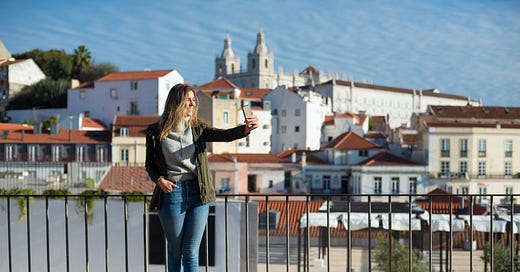Why starting a travel blog might be the best thing for your finances
Steph argues that blogging can be far more lucrative than journalism
The clocks have gone back and our favourite long-distance hiking event, World Travel Market, is on the horizon. It must be November. As the dark evenings set in and sunny, summer escapades around the globe look like a fever dream induced by gorging yourself on mountains of minced pies, we’re offering you an interesting proposition: to consider whether blogging might be a financially smart decision to adopt this year.
No, we’ve not had early access to the free booze for next week’s networking events. Steph’s here this month to tell you about how starting her own travel blog, Worldly Adventurer, was the smartest financial decision she’s ever made. Over the course of this month, she’ll also be discussing:
🔒 November 8: Exactly how her blog has both powered her journalism career and become a sustainable, full-time business in its own right
🔒 November 15: What the difference between travel blogging and travel journalism actually is
🔒 November 22: How other bloggers moved from journalism into running their own successful websites — and what you need to know if you plan on doing the same.
Want to read them all? Subscribe to get access to all newsletters in this blogging series, as well as paid content going forward.
Now buckle in as we chat blogging and the beauty of passive income.
Think about a travel influencer you’ve come across before. Can you feel it happening? First, there’s that little shake of the head, followed by the escape of an irritated sigh. And then: the eye roll. It’s an involuntary reaction, isn’t it?
If there’s a hierarchy in the travel media then, as far as journalists are concerned, influencers lie at the bottom. Bloggers and vloggers are perhaps one rung up, but both sit solidly beneath those at the apex: the travel journalists.
I’ve lost count of the number of sly comments I’ve heard journalists make about their industry colleagues, particularly those of the influencer variety. “They don’t even take any notes,” I’ve heard some complain, as if this is the cardinal sin that no journalist shalt commit. Others dismiss them as one-trick ponies, just there to take selfies of themselves looking unnecessarily sexy in front of places that are naturally already sexy enough.
In more positive appraisals, some have at least come away from a mixed journalist and influencer press trip with a begrudging respect for the hours of dedication that many influencers spend curating pictures for their social media accounts. But underneath you can bet there’s still the sense that bloggers or influencers or whatever they wish to call themselves just aren’t real members of the media.
It feels like many journalists believe travel bloggers, influencers and vloggers are breaking a crucial tenet of what makes a journalist credible: they’re just not doing anything particularly journalistic. They pose for a few snaps or spew out listicles without consideration for the characters or voices of a destination that are so central to any good travel feature. I’ve even heard some journalists try and blame bloggers and influencers for the way that the industry has changed in the past few decades, as if they’re the ones leading the onward march of heavily SEOed content now present in the online sections of most newspapers and magazines. We all know, deep down, that the decline of print media’s readership and global waning concentration spans are the real villains here.
As someone who straddles both sides of the content table as a journalist and a travel blogger, I’m in a unique position to comment on this conflict. Yes, I’ll agree with some of the disparaging comments levelled at influencers: their content can sometimes be vacuous and lacking in any sort of facts or informational depth. Others should take a long, hard look at themselves for jumping so easily into the pockets of Saudi Arabi or Syria as both seek to human rights wash their images. But many, many bloggers and influencers are providing truly informative and entertaining content that’s valuable and appreciated by their audiences — and making a lot of money in the process.
Blogging can be incredibly lucrative; more so than journalism has ever been for me. It stems from the fact that once you reach a certain stage with your website, you hit the realm of passive income: adverts and affiliates that trickle money into your bank account while you sleep. These are the same avenues used by major publications to help build their budgets, but in the case of blogging, you get paid continually for one article, rather than a one-off fee. Unlike journalism where you can find yourself relying entirely on commissions and struggling to predict what you’ll earn each month, as a blogger it becomes far easier to know what you can expect to hit your bank account.
In fact, despite spending 16 days on a press trip in September, I still earned £4,310 through my blog, with little effort on my part. This year, as visitors have flocked back to Latin America (the region I cover on my website) I’ve surpassed in seven months what I earned in each of the two preceding years — and we’ve not even hit the annual period when my blog sees its highest earnings.
Importantly, I don’t get paid to visit destinations, unlike many of my counterparts. Not all bloggers choose to uphold editorial independence and instead are brought into a country as part of a marketing campaign funded by a tourism board or destination. For me, maintaining this independence is an essential part of straddling both sides of the divide. It means I can write about places I visit both on my blog (in the form of those sometimes dull but highly-ranking listicles and visitor guides) and for other publications (by pitching those fascinating stories of people and places that wouldn’t otherwise drive traffic to my site). Ultimately, if a destination doesn’t cut the mustard, then, just like I would as a journalist, I will refuse to provide coverage.
Now don’t get me wrong: the road to passive income isn’t one devoid of its potholes or climate campaigners superglued to the tarmac. COVID was devastating for those of us with a website (much the same as it was for all of us in the industry) and it took almost two whole years for my site to recover from the decimation. There’s also a very steep learning curve when it comes to establishing a successful website that can weather Google updates and algorithm changes. And that’s before you even consider the competition from thousands of other bloggers and the media empires that have increasingly turned to SEO and advertising to make up their budget deficits.
But my work as a guidebook author and subsequent encyclopedic knowledge of Latin America have turned my site into one of the top resources about many countries within the region — and helped me establish a solid and (pandemic excepting) sustainable business model. And, before you ask, I also despise social media and certainly wouldn’t regard myself as an influencer; my business is almost entirely focused on my website, with Instagram and Facebook just a necessary evil for my brand.
Ultimately, blogging is a long-term strategy; returns certainly don’t come overnight. I started mine in 2016 and began making a survivable income by 2019; for many, it takes much longer. However, my website is on the cusp of giving me enough passive income to make my role mostly hands-off so I’m able to concentrate on the journalism that matters most to me. Not listicles, not hotel reviews but meaningful stories. Those ones that show how destinations, communities and individuals are using tourism projects as a force for good.
Still shaking your head and experiencing those involuntary eye-rolls? I get it. I rarely refer to my website as a travel blog: a travel website feels more palatable and serious. Whatever we call it, however, it’s a brilliant business strategy that gives me the financial freedom to follow my interests and ambitions — something that’s rarely a given in our industry.
So, should you start a travel blog?
You’re a destination expert and know a country or city better than pretty much anyone else. Leveraging your knowledge, and turning those service pieces and how-to guides that you would typically write for other publications into content for your own niche website could earn you significantly more money in the long term. After all, you won’t get paid just the once for them on your own site.
You’ve written a lot of guidebooks but have no contractual obligations around what you can do with your research. My website grew exponentially as a result of working on Moon Chile, a guidebook whose research and content I own fully — meaning I can repurpose it as I see fit. My blog has also driven book sales thanks to an audience who trusts my opinions and wants to support my work.
You’ve got the financial stability to invest some of your time into a business that won’t pay out immediately. It’ll take perhaps one or two years (particularly if you don’t have any experience in SEO or content strategy) before you could start taking home a meaningful amount. I founded my blog while living in South America on a shoestring; it’s much harder if you have existing financial commitments. Whatever your situation, you can always carve out a little bit of time in your existing schedule to write content and build your website and then grow it from there.
You hate social media as much as I do. Contrary to what you might believe, social media doesn’t have to form part of your blogging strategy. I’ll discuss why not in next week’s newsletter.
Tweet of the week
Yeh, it’s my tweet. But the point is a good one, particularly in light of last month’s mental health series. The financial freedom to make these decisions also comes thanks — you’ve guessed it — to my blog.

Who to follow
SJ Armstrong at National Geographic Traveller has been doing a tonne of commissioning this month, so give her a follow and keep an eye out to see if any destinations you cover pop up.

Industry must-reads
The Independent’s new Travel Smart TV series proves that innovation is still alive and well in our industry.


Congratulations to all the nominees for the British Guild of Travel Writers’ 2022 Members’ Excellence Awards and AITO’s Travel Writer of the Year Awards, plus extra congratulations to Shafik Meghji, Julia Buckley, Simon Calder, James Draven and Jamie Lafferty for their nominations in the Travel Journalism category of this year’s British Journalism Awards.
We look forward to celebrating with many of you at the BGTW’s Annual Gala Awards this Sunday. If you’re not a member and want to join this black-tie event being held at the newly refurbed Riverside Studios in Hammersmith, you can buy tickets for £162 (or just £90 if you persuade an existing Guild member to bring you as their plus one) here.
This was the first edition of our November blogging series. Know someone who might find it interesting? Share this newsletter — and encourage them to sign up to receive all of our free monthly newsletters.





For us, Substack has been absolutely critical to our finding a way to make a living from our travel writing. Not having to chase SEO or assignments is wonderful. I'll be curious to hear your thoughts about social media as it is a big part of our strategy. Fortunately, it's one I mostly enjoy!